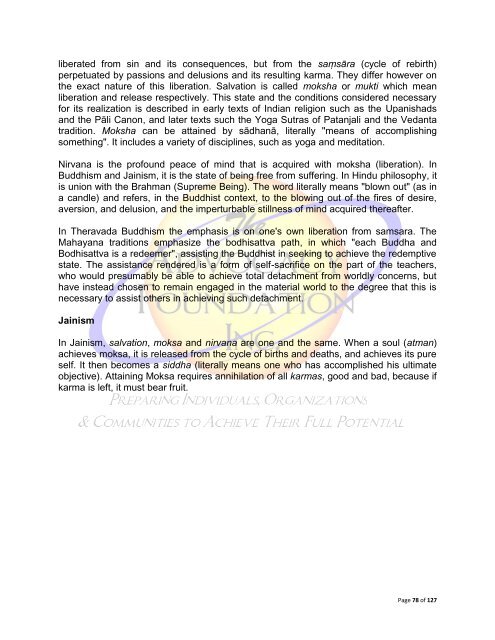Acquiesce to Righteousness
Acquiesce to Righteousness
Acquiesce to Righteousness
You also want an ePaper? Increase the reach of your titles
YUMPU automatically turns print PDFs into web optimized ePapers that Google loves.
liberated from sin and its consequences, but from the saṃsāra (cycle of rebirth)<br />
perpetuated by passions and delusions and its resulting karma. They differ however on<br />
the exact nature of this liberation. Salvation is called moksha or mukti which mean<br />
liberation and release respectively. This state and the conditions considered necessary<br />
for its realization is described in early texts of Indian religion such as the Upanishads<br />
and the Pāli Canon, and later texts such the Yoga Sutras of Patanjali and the Vedanta<br />
tradition. Moksha can be attained by sādhanā, literally "means of accomplishing<br />
something". It includes a variety of disciplines, such as yoga and meditation.<br />
Nirvana is the profound peace of mind that is acquired with moksha (liberation). In<br />
Buddhism and Jainism, it is the state of being free from suffering. In Hindu philosophy, it<br />
is union with the Brahman (Supreme Being). The word literally means "blown out" (as in<br />
a candle) and refers, in the Buddhist context, <strong>to</strong> the blowing out of the fires of desire,<br />
aversion, and delusion, and the imperturbable stillness of mind acquired thereafter.<br />
In Theravada Buddhism the emphasis is on one's own liberation from samsara. The<br />
Mahayana traditions emphasize the bodhisattva path, in which "each Buddha and<br />
Bodhisattva is a redeemer", assisting the Buddhist in seeking <strong>to</strong> achieve the redemptive<br />
state. The assistance rendered is a form of self-sacrifice on the part of the teachers,<br />
who would presumably be able <strong>to</strong> achieve <strong>to</strong>tal detachment from worldly concerns, but<br />
have instead chosen <strong>to</strong> remain engaged in the material world <strong>to</strong> the degree that this is<br />
necessary <strong>to</strong> assist others in achieving such detachment.<br />
Jainism<br />
In Jainism, salvation, moksa and nirvana are one and the same. When a soul (atman)<br />
achieves moksa, it is released from the cycle of births and deaths, and achieves its pure<br />
self. It then becomes a siddha (literally means one who has accomplished his ultimate<br />
objective). Attaining Moksa requires annihilation of all karmas, good and bad, because if<br />
karma is left, it must bear fruit.<br />
Page 78 of 127

















